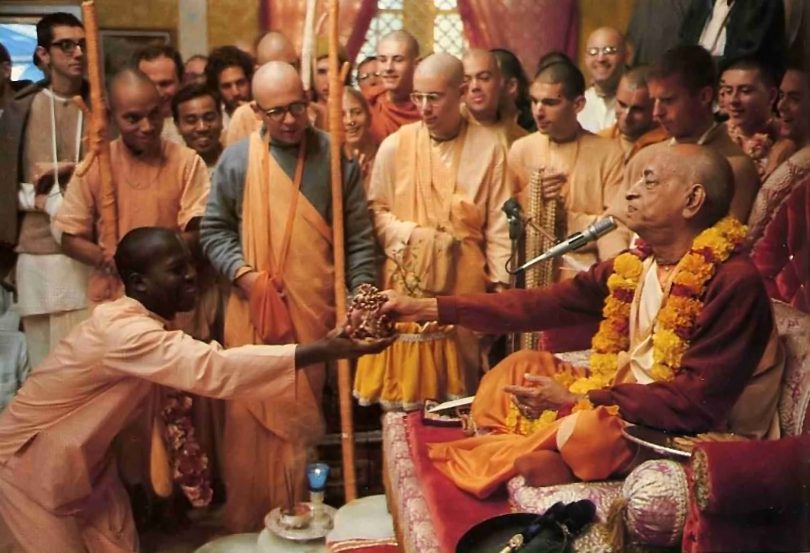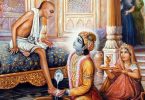Q. 1. How do I make sure that my gratitude for my spiritual master and those guiding me day-by-day in my spiritual life keeps on increasing, and does not become interrupted?
Answer by Romapada Swami: Below is an answer I gave to a similar question asked by someone else about hearing from a single source.
Q. 2. Also, in light of the above it seems necessary at some point for those engaged in hearing and reading to make references between guru, sadhu and shastra in order to develop correct understanding. However, I’ve also heard that one should hear from a single source in order to avoid confusion. This is a seeming contradiction in itself, which leads to the question: when is the right time to implement this system of understanding?
Answer by Romapada Swami: Once again, there is no contradiction in this principle, although there seems to be! The bona fide sadhu, shastra and guru are always in line with each other – the three-point check involves observing how each of them reinforces each other, which solidifies our faith in each of these.
Being familiar with shastra and previous saintly persons is essential to ascertain a bona fide guru in the first place, and yet factually one can have no access to the first two without the help of the latter. For instance, how would we know what is the bona fide version or meaning of Bhagavad-gita, without the help of a faithful representative of Bhagavad-gita in disciplic succession, such as Srila Prabhupada? But as we hear or study Prabhupada’s books and observe his life, we see that he had no personal opinion to offer; both his prachar as well as achar were perfectly in line with and bringing to life the messages of Bhagavad-gita and the teachings of the previous mahajanas which he presented. Thus, we can affirm that “Here is a bona fide guru”, based on the authority of sadhu and shastra, not just by personal or popular opinion. Simultaneously, the personal purity, empowerment and example of Prabhupada’s life reinforces our faith and understanding in the validity and practicability of shastra and the teachings of previous acharyas. Thus, reference to sadhu-shastra-and-guru help reinforce each other, and yet simultaneously it is through one’s personal spiritual master that one can gain access to sadhu and shastra, as well as properly understand how to practically and systematically apply their teachings in our personal life.
The three-point check is rendered futile if one doesn’t develop absolute faith in any one of them. Once having ascertained a bona fide spiritual master – in the light of sadhu and shastra — and having developed firm confidence that here is a transparent representative of Krishna and the disciplic succession, one should then set aside all of one’s personal conceptions and hear from the spiritual master in order to learn the proper conclusions of scriptures. This firm faith is the fulcrum or basis from which one is able to overcome all contradictions. Please note that the disciple still appreciates the spiritual master in the light of sadhu and shastra, not independently; but his reference to sadhu and shastra is not exactly for the purpose of perpetual cross-checking. Such an attempt to try to validate and substantiate every action or statement of guru or sadhu or shastra is not helpful when done without proper guidance – it could lead one into the realm of “apparent contradictions” discussed above, and weaken one’s faith, especially for the neophyte student who does not have deep grasp of scripture and spiritual principles.
By hearing from one spiritual authority, especially in the beginning stages or when one is riddled with contradictions, one develops the ability to see in synthesis. Isopanishad uses the word ‘anupasyatah’, or seeing through authority, by which one can become undisturbed by dualities. (Iso Mantra 7) The spiritual master knows the mentality of the disciple – what his doubts and possible areas of confusions could be – and thus he helps to address them and trains the disciple to see the world through the eyes of scriptures. Having gained the maturity and ability to see everything in synthesis, then one is able to hear from multiple sources and not become disturbed, because of having been thoroughly trained FIRST to see the underlying essential unity.
The second part of your question now –
Many devotees have a practice of writing gratitude journal everyday and they find that greatly beneficial in carrying on their day to day devotional practices as well as constantly remembering as to where they are getting the ability and understanding of performing some devotional activity. I am sure that you think about these things but in Kali Yuga it greatly helps to write things down. Writing helps to solidify our thoughts and helps those thoughts to sink into our heart more deeply.
Also try to regularly express gratitude to those who are helping you the most in your KC life, in writing or when appropriate in person. When there are opportunities of sanga amongst your peers, you can express to them how you are feeling supported by your mentors.







